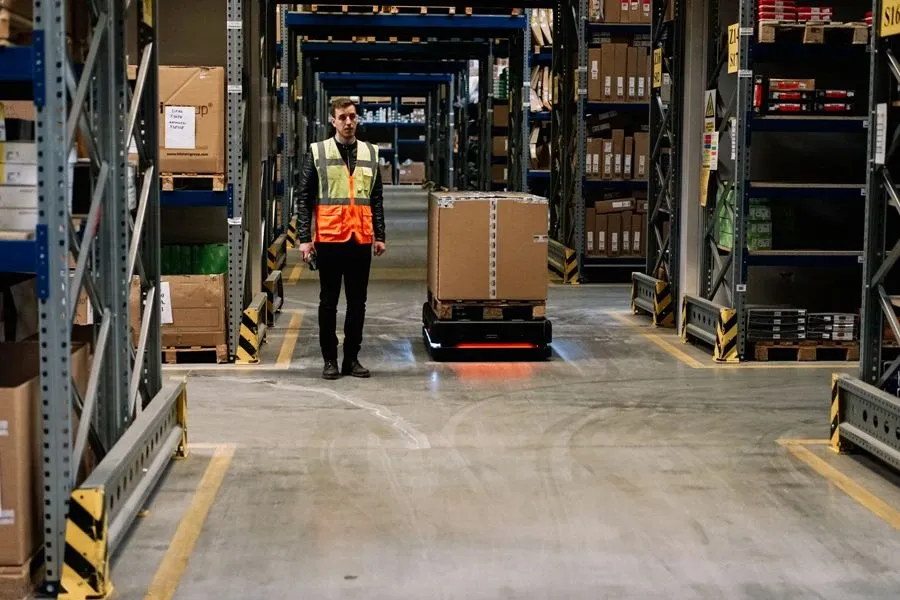The US Suspended Tech-Trade Talks with the UK
The US administration suspended technology-related negotiations with the UK government.

Gideon Brothers launched its second pilot project so far, with Atlantic Grupa, a Croatian FMCG leader with a significant European footprint. The project will see Gideon's logistics robots, fully autonomous machines thanks to breakthrough visual-perception technology, deployed in Atlantic’s brand new logistics distribution center, already geared for high efficiency.
This roll-out is significant because the use-case brings a new level of automation to Atlantic’s distribution center, aiming to seamlessly integrate the company’s warehouse management system (WMS). To achieve this, Gideon will be working with Symphony RetailAI, Atlantic's provider of WMS software. Atlantic’s new facility boasts entirely digitized, paperless warehouse operations, powered by a state-of-the-art warehouse management system. It will allow an optimized organization of storage and entirely digitized management of receiving, fulfillment, and shipping of goods as well as vehicle management.
The fully autonomous robots, a pallet-carrier with a load/lift capacity of 800 kg, will be incorporated into this digitized setting, bringing added efficiencies into the already streamlined picking operations. The specific use-case is based on a ‘swarm me’ approach to picking, where the robot moves from one warehouse area to the next, and the worker in charge of each area, along the most efficient route. It is expected that, among other benefits, the project will also alleviate staffing pressures.
Mladen Pejković, Senior Executive Director for ICT, Business Development, and Corporate Strategy at Atlantic, notes the importance of the project, confirming their role as an industry leader: “This is, without doubt, advanced technology and we see numerous advantages from its implementation. The first is, of course, the rising efficacy. The second is relieving the lack of workers, that affects not only tourism and manufacturing but also distribution. The earlier generations of robots, such as those Atlantic Grupa already implemented, do not allow collaboration and often require protective fences around the robots to ensure safety. We believe in this technology and are convinced that Gideon Brothers will achieve global success.“
Matija Kopić, CEO and Co-Founder of Gideon Brothers, points out the potential of the innovation: “Our Advanced Visual Perception technology is raising the bar of what autonomous mobile robots can do in a real warehouse and manufacturing environment, one that is highly dynamic and constantly changing. The performance of our robot in industrial environments that cripple competitors’ tech demonstrates the robustness of ours.“
The robot has also been deployed in Tokić, a leading Croatian car-parts retailer, where ‘on demand’ use-cases are being tested in their logistics distribution center. A test project soon starts in Zagreb-based Orbico, a leading consumer-products distributor in CEE, as well as a global logistics leader.
Gideon's robot perceives its environment via stereoscopic cameras, which are acting like a pair of eyes, underpinned by deep learning, giving it unparalleled navigation, safety, and data collection capabilities. Only two other suppliers develop autonomous technology based on visual perception. However, Gideon Brother’s breakthrough proprietary AI technology goes even beyond the few competitors.
It is the only autonomous mobile robot that understands its environment, recognizes the objects in it and their context. This understanding allows it to operate consistently in highly dynamic, continually changing warehouse and manufacturing facilities. It does so better and safer than machines based on LiDAR that are the robotics industry’s current cutting-edge technology.
The combination of hardware and software allows Gideon Brothers’ robot to detect machinery and indoor structures that LiDAR misses, such as the forks of an empty forklift which, according to safety procedures, must be placed as low as possible, just above the floor surface. Another distinctive value-added feature is its hot-swappable battery system, allowing batteries to be exchanged in operation so that downtime is brought to a minimum.
The robot requires little physical infrastructure, just pallet frames that allow the robot to pick-up and drop-off pallet loads, and a charging station for batteries. No modification of facilities is necessary. As the robot is fully autonomous, no special “marker“ infrastructure, such as magnetic tape or beacons, is needed.